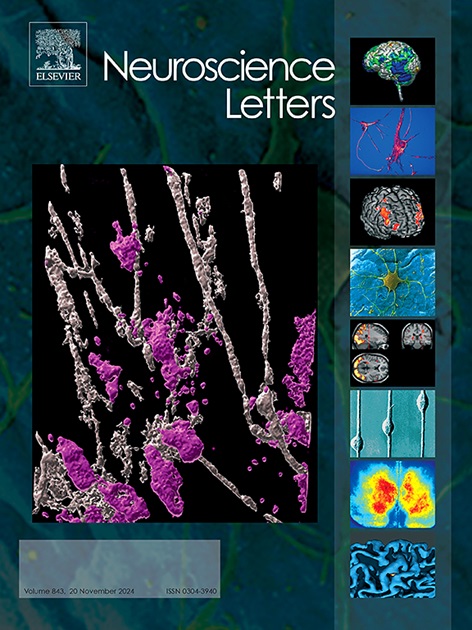Joint administration of sub-threshold doses of the acetylcholinesterase inhibitor donepezil with those of the NMDA receptor antagonist ketamine improved rats’ recognition memory abilities
IF 2.5
4区 医学
Q3 NEUROSCIENCES
引用次数: 0
Abstract
Alzheimer’s Disease (AD) is a serious progressive neurodegenerative illness conducting to the decay of cognitive functions. A few drugs have been approved for the therapy of AD, including the acetylcholinesterase inhibitors (AChEIs) like donepezil. Their efficiency, however, is modest and their application is associated with toxicity. Recently, the N-methyl-D-aspartate (NMDA) receptor antagonist ketamine, a rapidly acting antidepressant, has been proposed as a potential agent for the treatment of AD. The present study was designed to investigate the effects exerted by the combination of sub-threshold doses of donepezil with those of ketamine on rats’ recognition memory abilities. For these experiments, the object recognition task (ORT) and the object location task (OLT), two procedures assessing non-spatial and spatial recognition memory respectively in rodents were used. Post-training acute administration of inactive doses of donepezil (0.3 mg/kg) and ketamine (1 mg/kg) counteracted non-spatial and spatial recognition memory impairments. The present findings, although preliminary, propose that the combined administration of ketamine and donepezil could represent a new strategy for the therapy of memory disorders, a common feature of AD patients.
同时服用阈下剂量的乙酰胆碱酯酶抑制剂多奈哌齐和NMDA受体拮抗剂氯胺酮能提高大鼠的识别记忆能力。
阿尔茨海默病(AD)是一种严重的进行性神经退行性疾病,会导致认知功能衰退。目前已有一些药物被批准用于治疗阿尔茨海默病,其中包括乙酰胆碱酯酶抑制剂(AChEIs),如多奈哌齐。然而,这些药物的疗效并不显著,而且在应用过程中还会产生毒性。最近,N-甲基-D-天冬氨酸(NMDA)受体拮抗剂氯胺酮(一种快速作用的抗抑郁药)被提议作为治疗AD的潜在药物。本研究旨在探讨阈下剂量的多奈哌齐与氯胺酮联用对大鼠识别记忆能力的影响。实验采用了物体识别任务(ORT)和物体定位任务(OLT)这两种分别评估啮齿类动物非空间和空间识别记忆的程序。训练后急性服用非活性剂量的多奈哌齐(0.3 毫克/千克)和氯胺酮(1 毫克/千克)可抵消非空间和空间识别记忆障碍。本研究结果虽然是初步的,但认为氯胺酮和多奈哌齐的联合用药可能是治疗记忆障碍的一种新策略,而记忆障碍是注意力缺失症患者的常见特征。
本文章由计算机程序翻译,如有差异,请以英文原文为准。
求助全文
约1分钟内获得全文
求助全文
来源期刊

Neuroscience Letters
医学-神经科学
CiteScore
5.20
自引率
0.00%
发文量
408
审稿时长
50 days
期刊介绍:
Neuroscience Letters is devoted to the rapid publication of short, high-quality papers of interest to the broad community of neuroscientists. Only papers which will make a significant addition to the literature in the field will be published. Papers in all areas of neuroscience - molecular, cellular, developmental, systems, behavioral and cognitive, as well as computational - will be considered for publication. Submission of laboratory investigations that shed light on disease mechanisms is encouraged. Special Issues, edited by Guest Editors to cover new and rapidly-moving areas, will include invited mini-reviews. Occasional mini-reviews in especially timely areas will be considered for publication, without invitation, outside of Special Issues; these un-solicited mini-reviews can be submitted without invitation but must be of very high quality. Clinical studies will also be published if they provide new information about organization or actions of the nervous system, or provide new insights into the neurobiology of disease. NSL does not publish case reports.
 求助内容:
求助内容: 应助结果提醒方式:
应助结果提醒方式:


